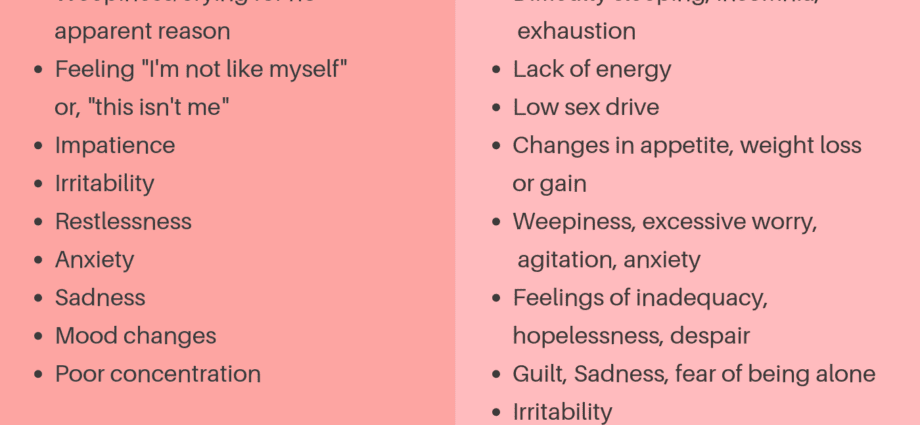Nội dung
- Baby blues and postpartum depression: very different causes
- Baby blues and postpartum depression: the duration of symptoms differs
- Postpartum depression requires real psychological follow-up
- One thing in common: impossible to predict in advance
- Postpartum depression and baby blues: go for a consultation quickly
- Trong video: Các triệu chứng của bé bị blues
- Trong video: ITW của Morgane sau khi sinh
The arrival of a baby irreparably turns a woman’s daily life upside down. She becomes a mother, faces new responsibilities, physical and psychological changes. The terms baby-blues and postpartum (or postnatal) depression are often used to refer to the depression and low morale that follows childbirth. However, these two psychological states do not have much in common.
Baby blues and postpartum depression: very different causes
Baby blues and postpartum depression differ primarily in their causes. ” The baby blues has a physiological cause which is the drop in pregnancy hormones, ”explains Nadia Teillon, midwife in Givors (Rhône). Consequently, ” emotions go up and down », And we go from laughing to crying without knowing why. Conversely, postpartum depression is not physiological. “It is rather due to a loss of landmarks, but it really depends on the women, like a depression that would occur in anyone,” explains the midwife. Often, it is an accumulation of several factors, such as great fatigue, a lack of support from loved ones, a feeling of loneliness, a baby that is difficult to manage or different from what we had imagined, that lead to depression. postpartum. This will not be expressed depressive symptoms such as very sadness, isolation, feeling of helplessness, loss of appetite for life, loss of appetite, Vv
Baby blues and postpartum depression: the duration of symptoms differs
Baby blues usually occur in the first few days after childbirth and that’s why it’s nicknamed “3rd day syndrome”. It does not drag on over time and only lasts a few days. On the other hand, thepostpartum depression can last for a long time, for a few months. It usually occurs between the 6th week and 12 months after the baby is born. Depression can also result from a baby blues that dragged on, especially because of a lack of support.
Postpartum depression requires real psychological follow-up
Baby blues and postpartum depression also differ in the treatment they require. Because it is only linked to the hormonal fall, the baby blues usually go away on its own as it did, after a few days, with support from those around it and with rest. Postpartum depression, for its part, will not go away on its own and requires real psychological care, or even medical treatment.
One thing in common: impossible to predict in advance
Postpartum depression and baby blues, however, have one important thing in common, according to Nadia Teillon: they cannot be predicted in advance. Thus, the risk of postpartum depression depends on the person’s history, on her environment: “a patient who is isolated, who is alone, who is facing a rupture, etc.” », Lists the midwife. Women with a depressive past are also more at risk. “It’s not the arrival of the baby that makes us become depressed, it’s a whole context that will come into play.” Likewise, the baby-blues will depend on each woman, on the way she will react to the hormonal discharge that follows childbirth. And if a woman had a baby blues or postpartum depression after her first pregnancy, it might not be the case for the second, and vice versa.
Postpartum depression and baby blues: go for a consultation quickly
Trong video: Các triệu chứng của bé bị blues
The midwife thus advises “not to anticipate things too much, not to think that this will inevitably happen to us. “However, as soon as symptoms appear (sadness, crying attacks, dismay, etc.),” do not hesitate to talk to those around you “and” go for a quick consultation “. Because “the sooner we go to consult, the more it will be able to be resolved easily,” says Nadia Teillon. And this advice is just as valid for a baby blues as it is for postpartum depression.










